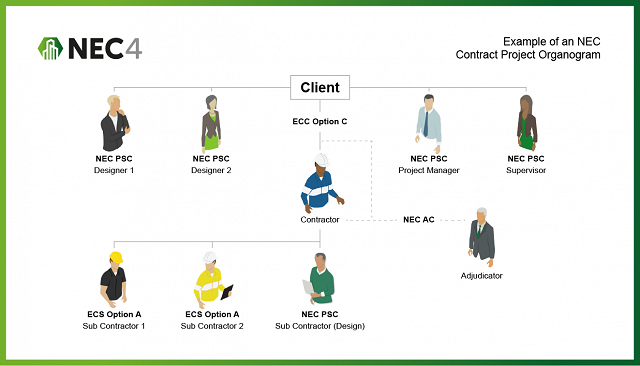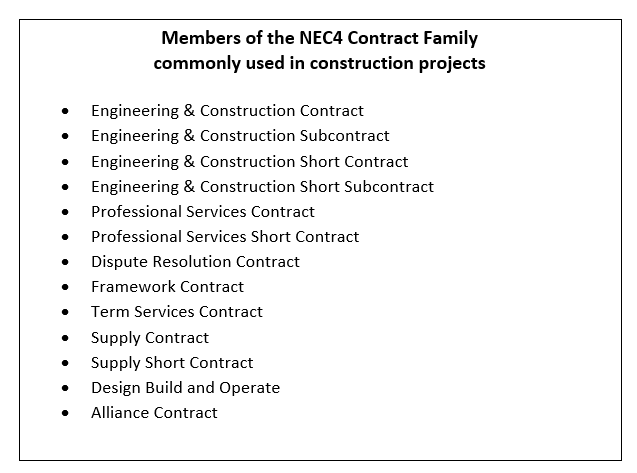Understanding NEC4 Contracts

Next year is the 30th anniversary of the inception of the NEC (New Engineering Contract), a suite of contract templates used across the construction industry and beyond to support good project management and minimise any risk of confusion or contract disputes.
RPC’s NEC4 expert, Chris Woodbridge, takes a look back over the history of the NEC and how it continues to evolve and bring benefits to the Project Management and Construction and Engineering sectors – and more.
First things first: What is the NEC?
NEC (the New Engineering Contract) is family of contracts common to engineering and construction projects. Originally created by the Institute of Civil Engineers and written by their knowledge business, Thomas Telford, in 1993, NEC is now widely adopted across the engineering and construction industries and the contract set continues to evolve with new additions and amendments, year by year.
One of the key and revolutionary aspects of the NEC contracts at their first inception was that they are written in plain language and are created with the intent of supporting good management, not frustrating it or creating confusion with complex legal clauses and terminology.
The History of NEC
The original contract of 1993 was revised with a second edition, NEC2, in 1995, incorporating the NEC Engineering and Construction Contract (ECC), Professional Services Contract (PSC), Adjudicator’s Contract (AC) and a suite of short forms and sub-contracts.
In 2005, the launch of the NEC3 Contract Suite added the Term Service Contract (TSC) and Framework Contract (FC), followed by a Supply Contract (SC) in 2010 and Professional Services Short Contract (PSSC) in 2013, by which time the NEC3 suite included 39 different documents, now being used internationally, including by the Association for Project Management, which uses the PSSC to support their appointment of project managers.
In 2017, the NEC suite underwent a further major revision with the launch of NEC4, this time adding the NEC4 Design Build Operate Contract (DBO) and the Alliance Contract (ALC) and updating and streamlining the existing contracts in the family.
The most recent new additions in 2021 were the new Facilities Management Contracts produced together with the Institute of Workplace and Facilities Management to support the Facilities Management sector and their important ongoing role within the engineering and construction industries.
After 24 years of use in the industry, NEC has emerged as the best practice model, continuously refined through user feedback and industry developments.
How do NEC Contracts help on a project?
NEC contracts have been used on multiple high-profile projects, including the London 2012 Olympics and Paralympic Games, Crossrail and HS2, and the use of NEC contracts is now mandated on all UK public sector projects. Projects managed with the NEC contracts have an extremely strong track record for being delivered on time and on budget – a resounding endorsement of the success and practicality of the contracts and the administrative and management frameworks they support.
By using the NEC contracts, project owners can be sure that their projects will be run using tried-and-tested project management and procurement protocols. Legal relationships between contractors, subcontractors, clients and more are all clearly delineated from the outset and everyone involved knows what is expected of them, how their contribution to a project relates to other phases of the job and that all are being governed by a coherent set of guidelines. The organogram below shows how different stakeholders and contractors within a project might be working under different contracts, but all within the consistent and complementary framework of the NEC, ensuring that expectations and responsibilities are aligned across the entire project, however complex.

The NEC suite of contracts are used mainly in the UK, but their use is spreading in a number of different global regions, including Australia, New Zealand, Hong Kong and South Africa and they are endorsed by governments and industry leaders worldwide. Other similar contract suites also exist, including FIDIC, which is endorsed by the World Bank, and JCT.
NEC is the standard contract suite for the UK’s construction, transport, water, nuclear, healthcare and local authority sectors. It is endorsed by the UK Construction Clients Board, the UK Government’s Crown Commercial Service, the Facilities Management Board of the UK Cabinet Office, The Association for Project Management and the British Institute of Facilities Management.
Collaboration, Communication, Cooperation
Collaboration is key, and from the very first NEC contract comes the aim that all parties should act throughout ‘in a spirit of mutual trust and cooperation’. The modular nature of the contracts offer wide flexibility within a framework that is clearly set out, enabling them to be tailored to accommodate different procurement or design processes and more. Early-warning notices, agreed compensation events handled during the project rather than at the end and an ongoing change management structure help to minimise disputes and the ability to incorporate KPI-based rewards and bonus schemes supports incentivisation and innovation within the project.
The fundamental difference created through the use of the NEC4 Contract is in the way it supports collaboration between different stakeholders on a project and underpins that with the highest management principles and a culture of fair treatment. This helps to minimise time and budget overruns and litigation on even the most complex projects, such as the Olympic Delivery Authority’s project to deliver venues and infrastructure for the 2012 Olympic and Paralympic Games – a project with a budget of £7 billion, but which is widely applauded as one of the most successfully staged Olympics in living memory.
Using NEC contracts spreads and minimises risk on complex projects such as this by giving clients the confidence that their project will complete on time and on budget, and helping to ensure that consultants, contractors, subcontractors and suppliers are fairly and promptly rewarded – aided by greater visibility than ever before throughout the entire supply chain. Savings in cost, time and sometime arduous litigation at the end of a project are all a beneficial consequence of managing a project using the NEC4 Contract suite.
Confidence and efficiency in contract compliance
RPC offers a full range of training in using NEC contracts, including understanding and executing compensation events, early warnings and payments, and dealing with different contract types, quality issues, pricing and more.
In addition, our NEC4 Contract Management solution, built with Oracle’s Primavera Unifier, delivers a fully integrated project controls platform that includes pre-configured, customisable forms, automatically calculated due dates and automatically generated reminders, built-in integration with Unifier’s cost management capabilities, and Primavera P6’s powerful planning and scheduling tool, and seamless combined reporting to enable better visibility of even the most complex projects at all levels. This solution supports the NEC4 contracts and helps to enable users to ensure compliance with the contract terms faster and more efficiently than before – and with greater confidence.
To find out more about how RPC can help you to manage your NEC contracts, contact Chris Woodbridge or sign up to join our NEC4 Web Series live webinars.










